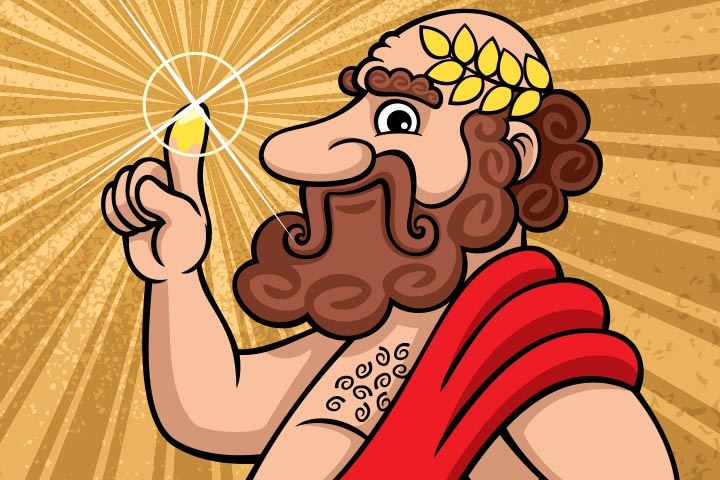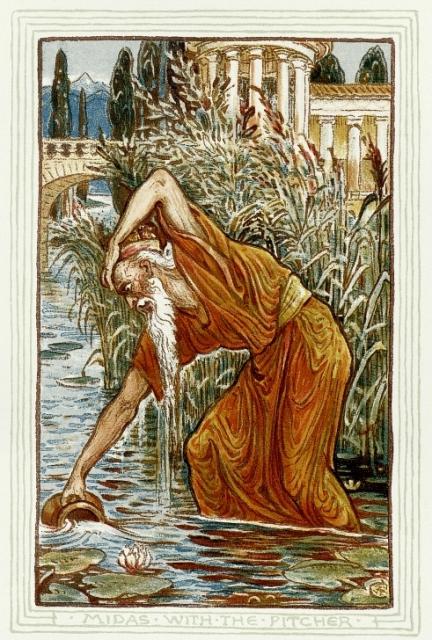

Chelsea House Publishers, 2009., 5 Parker, Janet, and Julie Stanton, editors. Flecks of gold were found in the sands of the river from then on. Midas did so, and the gold touch was lifted. Dionysus agreed to take the gold touch away, telling Midas to go to the River Pactolus and bathe in it, so that the water would wash away the gift of gold. He prayed to Dionysus to please take the gift away, saying that he had indeed been foolish to ask for it. And he couldn’t even touch his children or wife. Midas realized that he would starve amidst a fortune in gold. It turned to liquid molten gold when he tried to drink it. When he tried to eat some meat, it turned to gold as soon as it touched his lips. When he broke off some bread, the bread turned to gold. His servants brought his meal of bread and meat to him. His day of gold-colored dreams ended at dinnertime. He set about planning all the things he would turn to gold, including his palace and his clothing. He even turned trees into gold by touching them. He picked up objects like flowers and pebbles and they turned instantly into gold. Midas soon found that the god had been true to his word. The god tries to warn him, and asks Midas, “Are you quite certain?” Midas replied that yes, he definitely wanted the gold touch. Midas asks that everything he touches should be turned to gold. The king treats Silenus with great respect and orders a festival in his honor, before returning Silenus to Dionysus.ĭionysus is grateful to have his companion returned, and offers Midas a reward. Midas is delighted when he recognizes Silenus, whom he knows to be a follower of Dionysus. The farmers take advantage of his drunken state and tie him up with chains made with flowers, leading him to King Midas. One day, some Phrygians are working the fields when old Silenus, who is sometimes said to be a satyr, and who is a companion of Dionysus, wanders into the field drunk.

Midas is a devotee of the god Dionysus whose followers are known to be given to revelry. Midas’s foolishness causes him two distinct misfortunes, one in which he is given donkey ears by an angry god, and another in which he makes a very ill-advised wish. He inherited the throne from his parents, the goddess Cybele and Gordius, his father. Midas is a figure from Greek myth who was the king of Phrygia, a part of Anatolia which is now Asian Turkey.
MIDAS TOUCH MOVIE
“This young actor has the Midas touch, with every movie he becomes involved in breaking box office records and earning him millions.” He started a business out of his garage and in a year he was a millionaire.” Published by Oxford University Press.Want to see more videos from Idioms.Online? Subscribe to our YouTube channel! Examples Of Use We conclude that the tactile modality in social life may be much more important than previously thought.Īltruistic fMRI social social neuroscience somatosensory cortex tactile. The effect was predicted by activity in the primary somatosensory cortex, indicating that the somatosensory cortex here plays a causal role in prosocial behavior. We found that touching the hand increased the likeliness to behave prosocial (but not the general liking of control stimuli), thereby confirming the Midas touch effect. Before each round, participants were touched (or not touched in the control condition) by an experimenter. While lying in the scanner, participants played different rounds of the dictator game, a measure of prosocial behavior. Here, we aim to examine the neural underpinnings of this effect by employing a functional magnetic resonance imaging approach. With an impressive catalogue and strong roots in the underground D&B scene, Midas Touch are poised for an evergreen spot among the labels it was. Numerous studies reported similar effects of touch on different kinds of helping or prosocial behaviors. A classic study showed that customers give bigger tips when they are lightly touched by a waitress, which has been called the Midas touch effect. Previous studies have also demonstrated that interpersonal touch may affect our altruistic behavior. By touching someone, we can communicate various types of information. Giving and receiving touch are some of the most important social stimuli we exchange in daily life.


 0 kommentar(er)
0 kommentar(er)
